WordPress and ClickFunnels are two major platforms used by businesses, website owners, and entrepreneurs to establish an online presence. But which one is better suited for your needs?
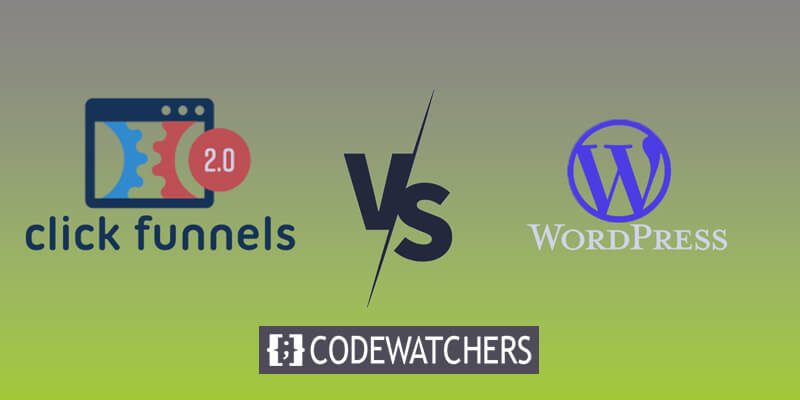
This article provides an in-depth comparison of WordPress Vs. ClickFunnels analyzes the key differences between these two platforms across factors like customization, ease of use, e-commerce capabilities, marketing tools, pricing, and more.
By evaluating the distinctive features, advantages, and limitations of both WordPress and ClickFunnels side-by-side, you can make an informed decision on which platform aligns best with your business goals and technical capabilities for creating websites or sales funnels.
Understanding ClickFunnels and WordPress
Clickfunnels
ClickFunnels has emerged as a game-changer in online marketing by offering an integrated solution for creating sales funnels, landing pages, and managing online businesses.
Create Amazing Websites
With the best free page builder Elementor
Start Now
The 2.0 version has expanded its capabilities, making it an appealing choice for entrepreneurs and course creators. This Software-as-a-Service (SaaS) platform streamlines the process of establishing and maintaining an online presence.
Despite its user-friendly features, users must operate within the framework set by ClickFunnels. Additionally, the platform offers a "Your First Funnel Challenge," a valuable resource for those seeking an introduction to ClickFunnels.
WordPress
In contrast, WordPress has long been a stalwart in the field of web development, claiming the title of the #1 most popular CMS and blogging software.
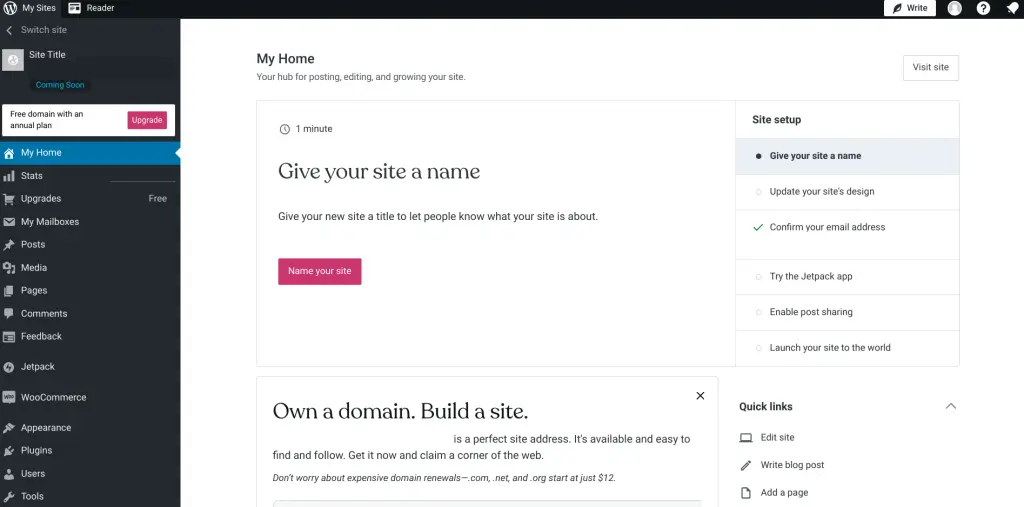
Trusted by major companies such as Disney, CNN, and Facebook, WordPress is a self-hosted platform renowned for its flexibility and customization options. Users enjoy complete control over their websites, akin to furnishing an apartment according to personal preferences.
However, this freedom comes with a steeper learning curve and the necessity to integrate various tools.
Costs: Which is Cheaper?
Clickfunnels
The pricing structure plays a crucial role in our decision-making process, particularly when it comes to website creation. ClickFunnels offers a 14-day free trial to allow users to explore its features before committing to a subscription.
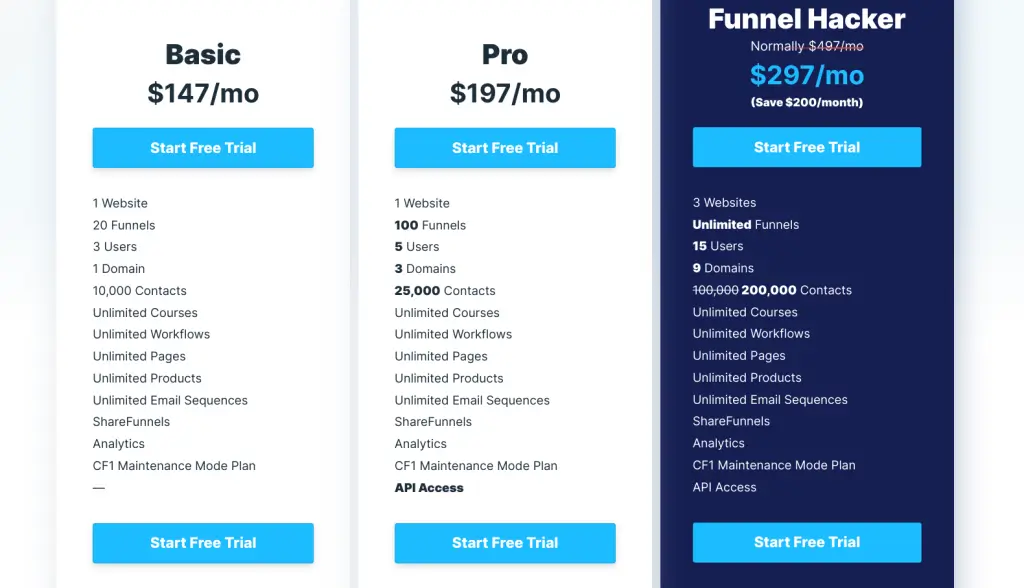
Following the trial period, users can choose from three distinct pricing plans. The Basic Plan, priced at $147 per month or $127 annually, includes features such as 1 website, 20 funnels, and a capacity for up to 10,000 contacts.
The Pro Plan priced $50 higher at $197 per month or $157 annually, offers the same single website but expands the funnels to 100 and increases the contact limit to 25,000.
For those with more extensive needs, the Funnel Hacker Plan stands as the highest tier. Initially costing $497 per month, it is discounted to $297, or $208 per month when paid annually. This top-tier plan includes 3 websites, unlimited funnels, and a capacity for up to 200,000 contacts.
These pricing options provide users with flexibility, allowing them to choose a plan that aligns with the scale and requirements of their specific web projects. The tiered structure ensures adaptability, enabling users to scale their subscriptions based on the evolving needs of their online ventures.
WordPress
The cost associated with using WordPress itself varies from $0 to $45 per month. However, these prices exclude expenses related to hosting, themes, plugins, or domain registration. As a general estimate, you can expect a basic WordPress website to cost around $75 per year.
It's important to note that these costs cover the fundamental elements and do not account for additional expenditures such as specialized themes, e-commerce add-ons, or unique design elements.
For a more detailed breakdown, here are some actual prices from different hosting providers:

- Basic plan: $2.95 per month for the first year, renews at $11.99 annually.
- Includes: 1 website, free domain, and SSL for the initial year.

- Single plan: $2.49 per month, renews at $7.99 monthly.
- This plan includes 1 website, unlimited free SSL, and 1 email account.

- Recommended WordPress Basic: $9.99 per month.
- Includes: 1 website, AI creation tool, 1 free domain, and a free SSL certificate.
It's worth emphasizing that the official WordPress prices do not encompass hosting, themes, plugins, or domains.
Balance of Ease and Learning Curve
Let's delve into the comparison of ease of use and the learning curve associated with ClickFunnels and WordPress for website building.
ClickFunnels: Easy and User-Friendly
ClickFunnels stands out as the user-friendly and straightforward option in the realm of website builders. It resembles a friendly neighborhood, offering a smooth and easy experience, even for those not well-versed in technology. Creating a sales funnel becomes a breeze, thanks to the simplicity embedded in its design.
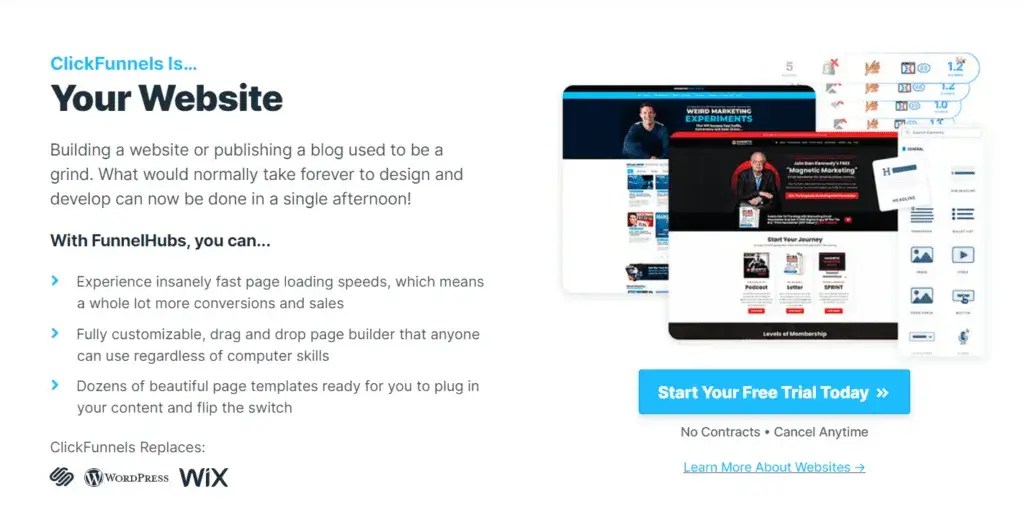
The platform provides ample resources to guide users throughout the entire process, complemented by explainer videos that aid in selecting the right funnel type. Navigating through ClickFunnels feels like a seamless journey through Funnelville. However, while its vast array of templates contributes to its ease of use, it can potentially limit creative flexibility.
WordPress: Flexibility with a Learning Hike
WordPress, on the other hand, is akin to the adventurous trail in the website-building landscape. Renowned for its flexibility, it can handle a diverse range of tasks, making it a go-to choice for those seeking versatility.

Setting up a basic site on WordPress doesn't require coding expertise, but as you venture into more complex territory, the learning curve can become steeper. While user-friendly themes exist, achieving advanced customization may demand a certain level of expertise.
In some instances, users may find it beneficial to enlist the help of a design team or a WordPress expert, especially if they are navigating the WordPress wilderness for the first time. In essence, WordPress offers flexibility but comes with a bit of a learning hike, particularly for those aiming for intricate customization.
Support and Troubleshooting
Support and troubleshooting are critical aspects when dealing with any platform, as issues can emerge unexpectedly. In this comparison, we'll delve into the support systems of ClickFunnels and WordPress to help you make an informed decision.
ClickFunnels Support
ClickFunnels elevates its support services through the incorporation of a chatbot feature, providing users with prompt and convenient assistance.
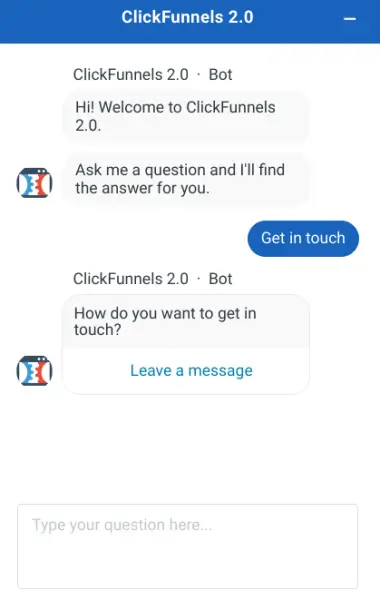
- Chatbot Assistance: The ClickFunnels chatbot is readily available to address your questions and tackle technical issues efficiently, offering a swift and user-friendly experience.
- Support Team Response: While the chatbot is a speedy option, contacting the ClickFunnels support team directly guarantees a response within 24 hours. This ensures that users are not left waiting for assistance, providing timely resolution to inquiries or concerns.
WordPress Support
WordPress support operates more like a community potluck, where the level of assistance depends on your chosen theme, plugins, and hosting company.
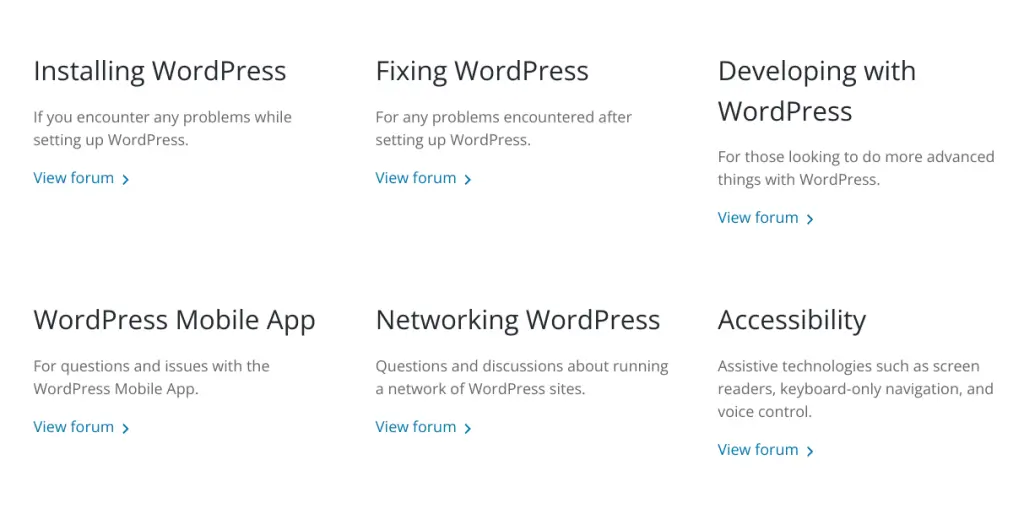
- Community Involvement: Navigating WordPress support may involve exploring community forums and engaging in a bit of trial-and-error. The effectiveness of the support system relies on the collaborative efforts within the WordPress community.
- Time-Consuming Nature: While the community-driven approach fosters a sense of community, it can be time-consuming. Users might find themselves navigating through various forums, missing the simplicity of direct communication for quick problem resolution.
SEO Capabilities
Optimizing a website or funnel for search engines is essential in today's digital landscape. Let's explore the different approaches to Search Engine Optimization (SEO) in ClickFunnels and WordPress.
ClickFunnels SEO
When delving into SEO within ClickFunnels, it's akin to lifting the hood of your car for some fine-tuning. ClickFunnels provides basic SEO options, allowing manipulation of metadata. This proves sufficient for paid advertising campaigns, ensuring that your promotions present a polished appearance.
However, the SEO toolkit in ClickFunnels is rudimentary, lacking the depth required for intricate SEO strategies. Users may find themselves yearning for more comprehensive features to address the complexity of SEO.
WordPress SEO
In the realm of SEO, WordPress stands head and shoulders above the competition, primarily due to the availability of powerful plugins. Notable plugins like Yoast or RankMath elevate the SEO game by offering top-notch support.
In WordPress, users enjoy complete control over essential elements such as meta tags, descriptions, titles, and more. It's akin to having an SEO maestro guiding you through each step of the optimization process.
Time Efficiency
the efficient use of time is crucial, directly translating to monetary gains. Let's examine the comparative advantages of two website creation platforms: ClickFunnels and WordPress.
ClickFunnels
ClickFunnels emerges as the speed champion in website creation. Tailored for those seeking a swift launch without grappling with plugins, hosting, or themes, it offers a hassle-free experience.
With its user-friendly interface and pre-designed templates, ClickFunnels provides a quick path to establishing your online presence. The emphasis here is on time-saving, allowing you to kickstart your business without unnecessary delays. Achieving a fully functional site within a week is well within reach.
WordPress
On the flip side, WordPress operates more like a marathon. If you're new to the platform, the journey to a fully functional site might extend over a few weeks. This process resembles an educational expedition, demanding time and effort, but the payoff is substantial in the long run.

As proficiency grows, the time investment for future projects decreases, transforming WordPress into a rewarding investment for your online presence. It's a platform that encourages continuous learning and growth as you construct your digital empire.
Flexibility
Establishing your online presence is crucial, and customization plays a pivotal role in ensuring that your website accurately reflects you and your business. Two popular platforms, ClickFunnels and WordPress, approach customization differently:
ClickFunnels
ClickFunnels adopts a streamlined design approach reminiscent of a well-organized room with a predefined structure. While it provides a degree of flexibility for adjustments, the core structure is already in place. However, ClickFunnels has a smaller theme marketplace compared to WordPress, and the available themes can be relatively expensive. The customization options primarily revolve around adding your personal style and branding, but they are within the confines of the provided templates. Think of it as adding your own decorative touch to a well-furnished space without completely rearranging the furniture.
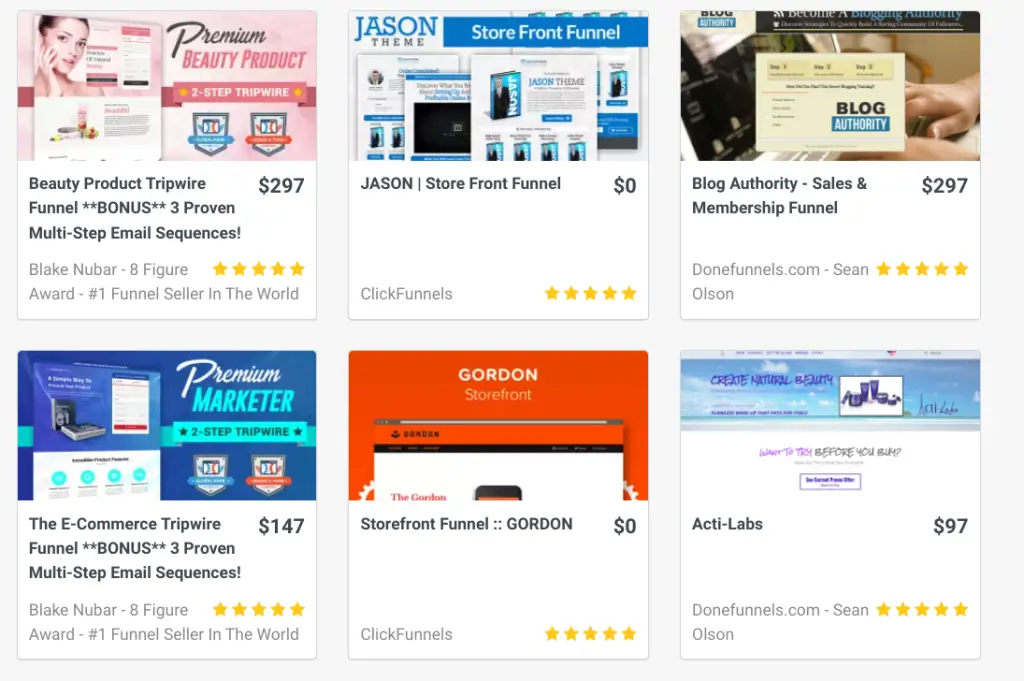
ClickFunnels Highlights:
- Streamlined design approach
- Smaller theme marketplace
- Themes can be expensive
- Freedom within template confines
WordPress
WordPress, on the other hand, is a playground of infinite possibilities, boasting over 11,000 free themes and builder like Elementor and Divi. This platform provides creative freedom, allowing you to design your site exactly the way you envision it. The level of flexibility, however, depends on the themes and plugins you choose. Some themes open the door to vast customization, while others may present certain limitations. Finding the perfect theme is crucial for aligning with your creative vision. Similarly, plugins play a significant role in shaping the flexibility of your web design, as the choices you make can drastically impact the customization options available.
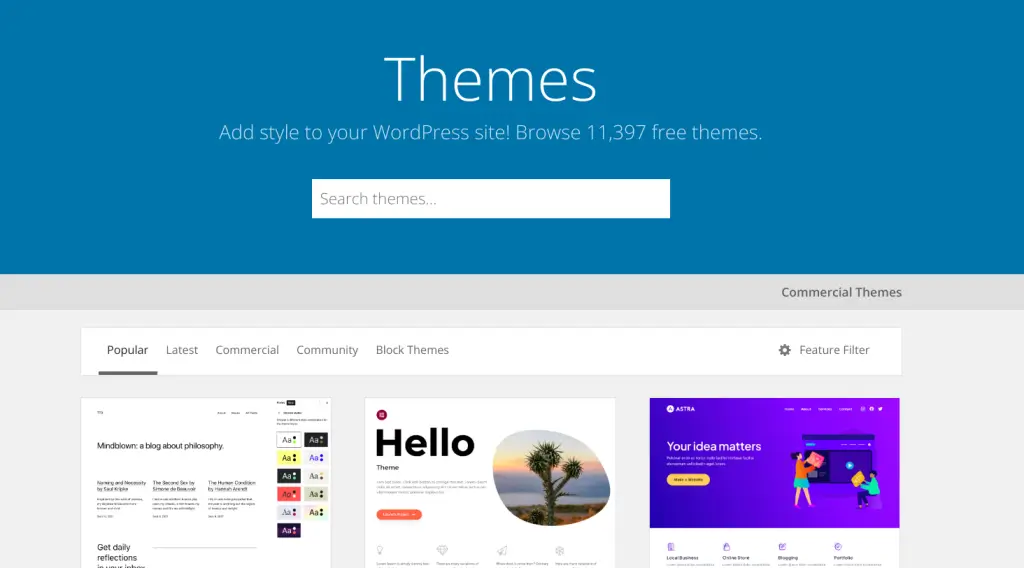
WordPress Highlights:
- Infinite customization possibilities
- Over 11,000 free themes
- Flexibility influenced by chosen themes and plugins
- Importance of finding the right theme for creative vision
So Which One You Should Go With?
When comparing WordPress and ClickFunnels, WordPress comes out ahead for most website creators and business owners. One major reason for this is the significant difference in pricing. WordPress starts at just $2 to $4 per month for basic hosting and capabilities, whereas ClickFunnels pricing begins at $97 per month. This major price difference gives WordPress a clear advantage, especially for small businesses and startups on a tight budget.
In addition, while ClickFunnels does offer a more user-friendly editor and interface, WordPress still has a wealth of resources, tutorials, themes, and plugins available to empower customization for users of all skill levels. The WordPress community is also vastly larger and more supportive when website owners need troubleshooting assistance or help with inquiries.
Furthermore, WordPress has superior SEO capabilities out of the box, thanks to stellar plugins like Yoast SEO that make optimizing content for search engines a breeze. This gives WordPress sites a leg up in terms of visibility and organic search traffic.
Finally, the flexibility of WordPress far surpasses ClickFunnels regarding options for hosting providers, themes, plugins, and customization. Website owners have full control to shape their site as desired over time.
So while ClickFunnels does have strengths in some areas, overall WordPress emerges as the Editorial choice for most website needs with advantages in pricing, customization, community support, SEO, and long-term flexibility.





